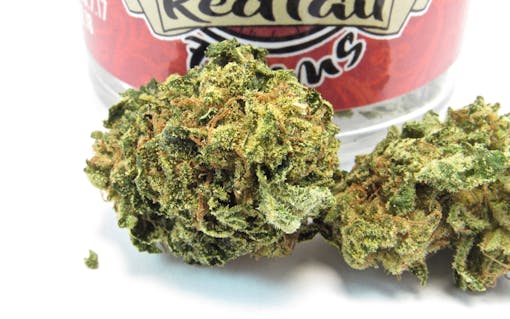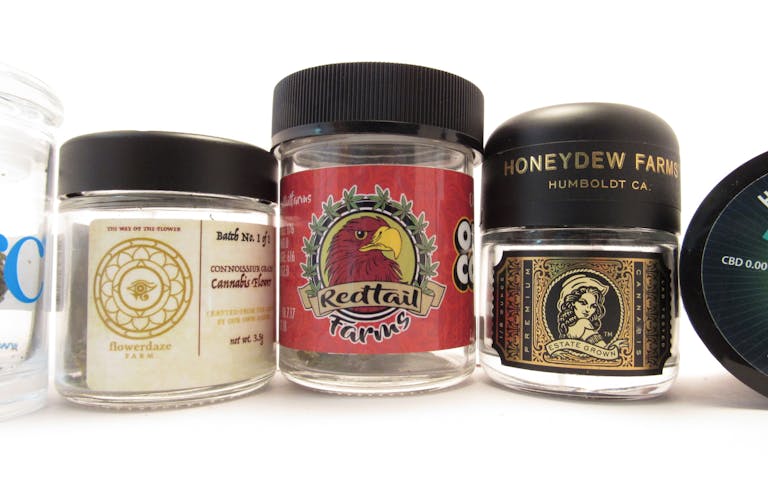We’re living through dark days in California right now.
Legalization Proposition 64 has kicked in. The billion-dollar cannabis market is transitioning and in turmoil. Supplies are down. Demand is up. Eighth-ounces of flower have been spotted cresting $93 in San Francisco—double pre-legalization prices. Regular shoppers are frustrated. New consumers are shocked.
Love Deals on Cannabis?But take heart, dear reader. Do not be bummed about the top-shelf in California right now. Set your sights lower. The real story of California cannabis in 2018 is something much more hopeful: it’s about the rise of “mids”—middle-tier quality cannabis at fair prices.
Bargain shopping for mids is like truffle hunting or mushrooming. It’s real-life Pawn Stars or Storage Wars. You can find amazing mids at reasonable prices all across the state right now. It just takes a little skill, persistence, and patience. And the sheer act of mids shopping makes the world a better place.
Here’s why I stopped worrying and learned to love to settle for the middle.

California “Mids” Are Global Dank
Mids is modern slang for “middle,” as in “middle-grade cannabis.” It’s not the best. That’s “exotic” or “designer.” But it’s not the worst, dubbed “schwag”, “regs,” or “reggie.”
California’s market is so competitive and advanced, what locals call “mids” will get most tourists zonked out of their gourds. Mids are perfect for out-of-state visitors who want to sample the local grass, but don’t want to make a panicked call to Poison Control. They’re perfect for older baby boomers getting back into cannabis, or for nervous nellies, and other dabblers.
In California, modern “mids” are stronger than at any time in history, testing at 10-16% THC. High THC would be 16-25%. Lower than 10% THC is now considered “bammer.”
Find Legal Cannabis Near You

The Market Is Upside Down
Another reason to reconsider mids in California: the market is all distorted. As regulations bite down, the supply chain is in turmoil. Low-priced cannabis can sometimes be higher quality than the product riding the top shelf.
We’re finding disappointing, weak-smelling, outdoor-grown cannabis with a trendy name like Lemon Tree going for $70 per eighth. By contrast, the same club, SPARC in San Francisco, had amazing store-brand Pineapple at $35.
Across the state, you’ll find a similar dynamic: $65 Cookies eighths missing their trademark aroma, sitting next to $40 indoor, high-grade bud with an off-trend name like “Orange Sicle” so loud it jumps out of the jar and slaps you.
Traditionally, the look, smell, taste or effect of mid-grade cannabis might be sub-optimal. Mids might consist of small, airy “popcorn” buds instead of large, dense attractive nugs.
“Don’t be foolish enough to stuff your blunt with $60 of flower while underfunding your 401K.”
Mids can be too dry or too brown due to its age, or because of how the cannabis was harvested or stored. Mids are often grown outdoors, or under cheap coverings called “hoop houses.” They can taste a bit grassy, owing to a bad cure. Or they can hit a bit harsh, owing to leftover nutrients in the flowers. Even great bud can become mids if it’s stored too long or improperly.
But nowadays, price won’t always match quality. Some stores have their own farms and in-house brands that cut the middleman out to bring you wholesale prices. Meanwhile, some branded bud is a year-old, and multiple middlemen have tacked on their fees to the retail price.
How to find quality mids? You have to look beyond THC percentages on dispensary menus. Actually examine the herb and smell it. Go to places that let you open jars and work your nose. Unlike Washington and some other states, sniffing samples is still legal in California. Smell for terpenes, the plant’s aroma molecules, which shape and enhance the effects of THC. If a product doesn’t have riotous terps, it’s a hard pass at any price.
Recently at the Local Sesh—a small Northern California event where you could buy and smoke legal cannabis—mids were all the rage. Yes, there was Synergy Strawberry Kiwi at $75 per eighth. But all the action was at the mids table:
- You could get Blue Dream from Honeydew Farms for $35.
- Autumn Brands had a $35 no-tax Chemdawg from coastal greenhouses near Santa Barbara.
- Red Tail Farms’ Orange Cookies was a steal at $40.
- Humboldt Sky sold heirloom, solar-powered, rain-watered “Rise” at $35.
- Flowerdaze Farms—way up in Trinity County—took home an Emerald Cup in 2017 for their regenerative farmed bud. At Local Sesh, Flowerdaze had fresh, top-shelf, Key Lime Pie for a farm-direct discount of $40.

Mids Are Egalitarian
Legalization has occurred at the height of the worst income inequality in America history and the two issues intersect at the cash register. Paying $93 per eighth-ounce of flower, while sick patients can’t afford your shake feels…wrong. Overpaying for sneakers, liquor, and now, cannabis these days is gauche. “Designer” cannabis chafes the egalitarian sensibilities of many Americans. It stinks of aristocracy and elitism and defies US traditions like frugality and economy.
Go on social media and you’ll see rappers and aficionados bragging that #wedontsmokethesame. Really? Sure, you could drink only Macallen 72 Years Old for every occasion, but you’d be that guy. Sometimes, a cheap lager is most appropriate.
Mids Are Guilt-Free
Don’t be foolish enough to stuff your blunt with $60 of flower while underfunding your 401K. Save for a rainy day and get just as high with two bowls of mids instead of one bowl of exotics. Mids make great big fat party joints — who cares when someone accidentally drops it in a cup of beer?
“Mids don’t get me high,” some say, proud of their high tolerance. But how cool is a high tolerance? Tolerance just means you’ve downregulated your brain’s cannabinoid receptors, so you need more THC to get the same effect. Congratulations, you just made enjoying being high more expensive.
Mids Are the Future
Lastly, mids are the future for all of us. Cannabis legalization leads to rapid industrialization and price declines as steep as 90%. As more and more large-scale cannabis farms come online, cannabis markups are normalizing.
That means the end of the standard $60 eighth price point from 2005. It means the rise of a spectrum of prices, from $50 ounces now common in Washington and Oregon, to high-end extracts that go for $100 per gram like it’s caviar.
Buying one does not take dollars away from the other. It’s not a zero sum game.
Budtenders are seeing a common practice borrowed from alcohol shopping: buying budget beer for the week, and plowing those savings into a splurge for the weekend. Vote with your dollars for affordable herb to exert downward pricing pressure that benefits us all.
So quit aiming for the stars and get out there and try mucking about in the middle. It’s stronger, cheaper, cleaner, more diverse and more abundant than ever before.
The bowl is not half-empty—it’s half-full.





